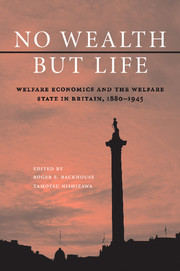Book contents
- Frontmatter
- Contents
- Contributors
- Preface
- 1 Introduction: Towards a Reinterpretation of the History of Welfare Economics
- I CAMBRIDGE WELFARE ECONOMICS AND THE WELFARE STATE
- II OXFORD ETHICS AND THE PROBLEM OF WELFARE
- 5 The Oxford Approach to the Philosophical Foundations of the Welfare State
- 6 J. A. Hobson as a Welfare Economist
- 7 The Ethico-Historical Approach Abroad: The Case of Fukuda
- III WELFARE ECONOMICS IN THE POLICY ARENA
- IV POSTSCRIPT
- Index
- References
6 - J. A. Hobson as a Welfare Economist
Published online by Cambridge University Press: 06 July 2010
- Frontmatter
- Contents
- Contributors
- Preface
- 1 Introduction: Towards a Reinterpretation of the History of Welfare Economics
- I CAMBRIDGE WELFARE ECONOMICS AND THE WELFARE STATE
- II OXFORD ETHICS AND THE PROBLEM OF WELFARE
- 5 The Oxford Approach to the Philosophical Foundations of the Welfare State
- 6 J. A. Hobson as a Welfare Economist
- 7 The Ethico-Historical Approach Abroad: The Case of Fukuda
- III WELFARE ECONOMICS IN THE POLICY ARENA
- IV POSTSCRIPT
- Index
- References
Summary
INTRODUCTION
John Atkinson Hobson is renowned as an economic heretic. As a result of the remarks made by Keynes in his General Theory (1973 [1936]: 364–71) Hobson's heresy is generally associated with underconsumption. It can legitimately be argued that this permeates his work, from his first book, written with A. F. Mummery (1992 [1889]) to his writing on unemployment in the 1930s, taking in his analyses of industrial capitalism and imperialism along the way. Furthermore, in his autobiography, Confessions of an Economic Heretic (1938) Hobson presents underconsumption as the heresy that led to his systematic exclusion from academia. However, the Confessions also presents a different view. Underconsumption is ‘an early heresy’ – ‘the first open step in my heretical career’ (1938: 30). His ‘most destructive heresy’ (1938: 168), on the other hand, was that bargaining power was unequal between buyers and sellers, meaning that ‘whether under monopoly or so-called competitive conditions, markets are intrinsically unfair modes of distribution’.
Distribution by needs is not even approximately achieved by the ordinary higgling in a so-called competitive market. Everywhere, inequality of bargaining conditions, based on differences of needs, is represented in different amounts of gain.
(Hobson and Mummery 1992 [1889]: 191–2)The reason why more attention had been paid to underconsumption than to this critique of markets was that the former was ‘a quarrel within the range of quantitative economic science’ (Hobson and Mummery 1992 [1889]: 164); the latter was ignored because it was too radical.
- Type
- Chapter
- Information
- No Wealth but LifeWelfare Economics and the Welfare State in Britain, 1880–1945, pp. 114 - 135Publisher: Cambridge University PressPrint publication year: 2010
References
- 2
- Cited by



